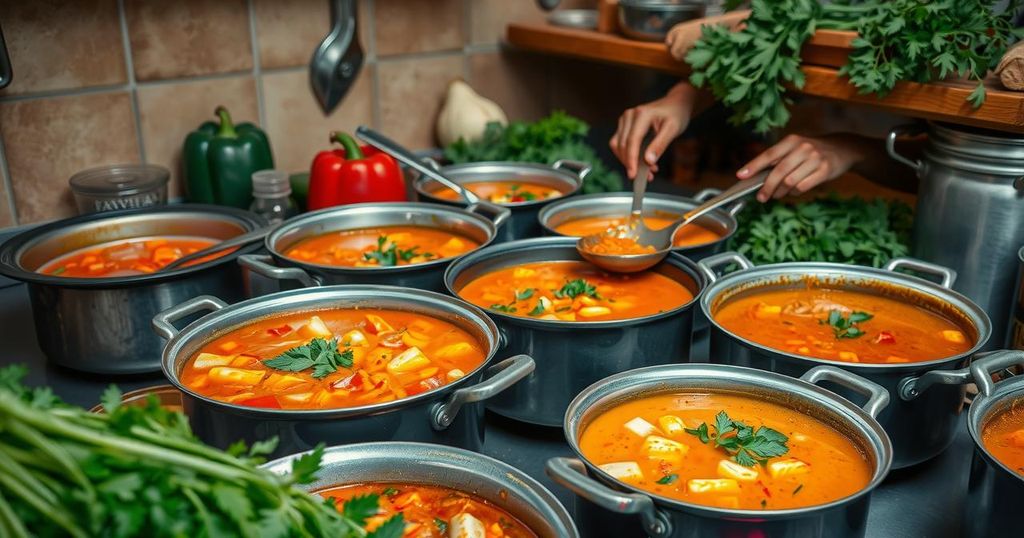Exploring Ramadan Eating Habits in Morocco: A Cultural and Health Perspective
During Ramadan, Moroccan families experience increased food consumption and cultural expectations around lavish iftar meals, resulting in significant food wastage and financial strain. While some women feel pressure to meet these expectations, others adopt more balanced meal preparations to promote health. Experts warn against the health risks associated with overindulgence and advocate for mindful eating throughout this holy month.
The month of Ramadan is a significant period for Muslims globally, characterized by fasting until sunset. In Morocco, this month has transformed the daily schedules of banks, businesses, and schools, along with increased shopping activity. Leading up to Ramadan, families stock up on essential ingredients, and women skillfully plan meals for iftar—dinner at sunset—and suhoor—the pre-dawn meal, which are enjoyed together as families. However, food consumption reportedly rises by 40 to 50 percent during Ramadan, attributed to impulse buying and extravagant meal preparations, as noted by the Moroccan Federation for Consumer Rights.
Iftar tables serve as the centerpiece of Moroccan culture, adorned with a variety of rich and elaborate dishes, reflecting the abundance expected during this period. However, this tradition may lead to significant food waste, with massive amounts of prepared food discarded daily. Despite Ramadan’s emphasis on mindful consumption and gratitude, these cultural practices can strain household budgets, especially amid rising food prices for staples. The financial pressure on families can be particularly burdensome as many struggle to afford basic groceries due to skyrocketing demands.
Many women, such as Maria, a housewife from Rabat, experience heightened pressure during Ramadan to create lavish iftar tables. She highlights the conflict between her spouse’s desire for a plentiful table and her own challenges managing an adequate meal. “Much of the food I prepare ends up in the trash,” she laments, illustrating the dissonance between tradition and practicality. Each Moroccan wastes an average of 91 kilograms of food each year, a number that increases during Ramadan.
In contrast, others, like Shaima Salmi, have chosen to adopt a different approach to meal preparation. Salmi emphasizes creating balanced meals with smaller portions that are easier to prepare while ensuring nutritional needs are met. A cultural shift is apparent; sociological insights suggest that overemphasis on taste and quantity, propelled by media influences and changing social expectations, contribute to this phenomenon. Professor Ahmed Drissi of Abdelmalek Essaadi University notes that the historical perspective of iftar, once focused on simplicity, has transformed into a culture of excess.
Health professionals express concern over Ramadan’s eating habits, specifically the overindulgence during iftar. Dr. Faiçal Serrou mentions a surge in digestive issues linked to rich diets, urging moderation in meal composition. He cautions against excessive consumption of fried foods and sugary treats, advocating for balanced meals with a focus on vegetables, fruits, and whole grains instead.
Nutritionist Mariam Khaldi corroborates these concerns, emphasizing the danger of prioritizing quantity over quality in Ramadan meals, leading to adverse health effects. Her advice includes practicing portion control and mindfulness during eating, promoting a healthier balance during this holy month and highlighting the potential for positive dietary transformations.
In summary, the transformative nature of Ramadan has brought about significant changes in Moroccan eating habits, emphasizing cultural traditions but also leading to challenges such as food waste and health issues. As families adapt their traditions against the backdrop of economic pressures, advocating for nutritional mindfulness becomes increasingly relevant.
In conclusion, while Ramadan is a time for spiritual reflection and fasting, the associated cultural practices in Morocco often lead to excess consumption and food wastage. The increased emphasis on extravagant iftar meals presents challenges not only financially but also health-wise, highlighting the need for a reevaluation of these customs. By prioritizing nutritional balance and mindful eating, families can transform this holy month into an opportunity for both spiritual and physical well-being.
Original Source: www.moroccoworldnews.com




Post Comment